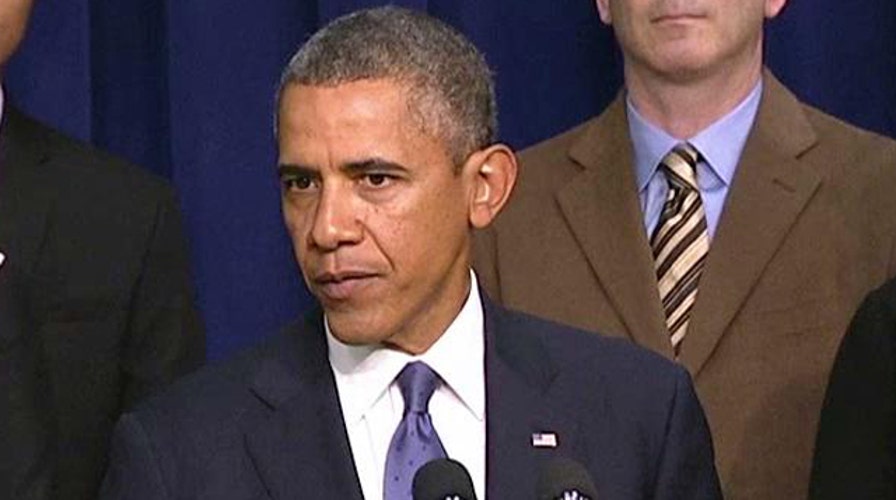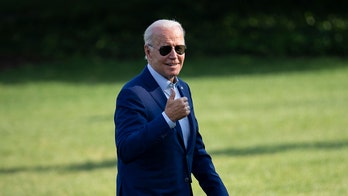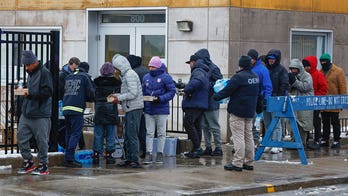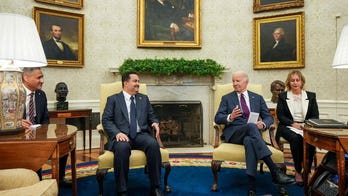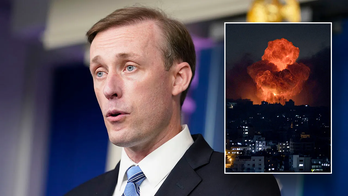Obama: We are confronting yet another mass shooting
President remarks on Washington Navy Yard shooting
President Obama planned to give an economic pep talk Monday to mark the five-year anniversary of the financial crisis.
But as reports emerged of the deadly shooting nearby at the Washington Navy Yard, the president found himself juggling two sharply different topics -- addressing the tragic mass shooting, before launching into a blistering assault on congressional Republicans for their budgetary demands.
"I cannot remember a time when one faction of one party promises economic chaos if it can't get 100 percent of what it wants. That's never happened before. But that's what's happening right now," Obama said.
White House Press Secretary Jay Carney was later peppered with questions on the tone of the president's remarks. While Obama opened his address by calling the victims of the mass shooting "patriots" and vowing to get to the bottom of what happened, he quickly pivoted to his remarks about congressional Republicans.
Carney defended the president's remarks, saying that with Washington facing some looming deadlines, "Congress needs to act."
He said Obama was addressing "the need to make sure that we, as a nation, do not make mistakes ... and reverse the progress that we've achieved."
He said it was "entirely appropriate" for Obama to address the shooting at the beginning of the remarks. Asked if there was any consideration given to canceling the remarks given the shooting situation, Carney said there was not.
Obama did delay his remarks to allow Washington's mayor and police chief to update the public on the situation. He pledged to make sure "whoever carried out this cowardly act is held responsible."
In the remarks, the president reiterated his refusal to negotiate with Republicans over the debt ceiling. And he called on Congress to "pass a budget without drama."
Washington is facing an end-of-the-month deadline to pass at least a short-term spending bill, but some Republicans are holding it up because they want the measure to be tied to a vote on de-funding, or possibly delaying, ObamaCare. Following that deadline is a mid-October deadline to approve an increase in the debt ceiling.
Obama was direct in addressing the lingering opposition to his signature health care law.
"So let's put this in perspective. The Affordable Care Act has been the law for three-and-a-half years now. It passed both houses of Congress. The Supreme Court ruled it constitutional. It was an issue in last year's election, and the candidate who called for repeal lost," he said.
House Speaker John Boehner (R-Ohio) responded to the president's speech later Monday with a statement saying, "It's a shame that the president could not manage to rise above partisanship today. Instead, he should be working in a bipartisan way to address America’s spending problem -- the way presidents of both parties have done before. He should work with us to delay his health care law for everyone -- just as he’s done for big businesses -- expand energy production, simplify our tax code, and more. The president is right that we’re 'not yet where we need to be,' which is why Republicans will stay focused on growing our economy and expanding opportunity for all Americans."
The president was flanked by Americans the White House says have benefited from his administration's economic and banking policies. Those policies, he said, have laid a "new foundation" for economic growth, though he acknowledged that the recovery is not being felt by many middle class people.
The White House's National Economic Council on Sunday issued a report detailing policies that it says have helped put the economy on a path toward growth. Those steps range from the unpopular Troubled Asset Relief Program, or TARP, that shored up the financial industry and bailed out auto giants General Motors and Chrysler, to an $800 billion stimulus bill to sweeping new bank regulations.
Gene Sperling, a top Obama adviser and director of the National Economic Council, said Obama's policies "have performed better than virtually anyone at the time predicted."
But the public is not convinced that the economy is on the mend. Only one-third say the economic system is more secure now than in 2008, and 52 percent say they disapprove of Obama's handling of the economy, according to a Pew Research Center poll. There is still plenty of pain to justify their pessimism.
Despite job growth, the unemployment rate remains high at 7.3 percent. Though the rate has fallen, one of the reasons is because some people have dropped out of the labor force and no longer are counted as job seekers. The share of unemployed workers who have been unemployed for more than six months is more than double what it was in 2007 before the recession began. And the income gap between the very rich and the rest of the population is the biggest since 1928.
What's more, some banks that received government aid because they were deemed "too big to fail" are now bigger than they were in 2008, although they are smaller as a share of the economy than the largest banks in other big economies. Three years after Obama signed a sweeping overhaul of lending and high-finance rules, execution of that law is behind schedule.
The Associated Press contributed to this report.
